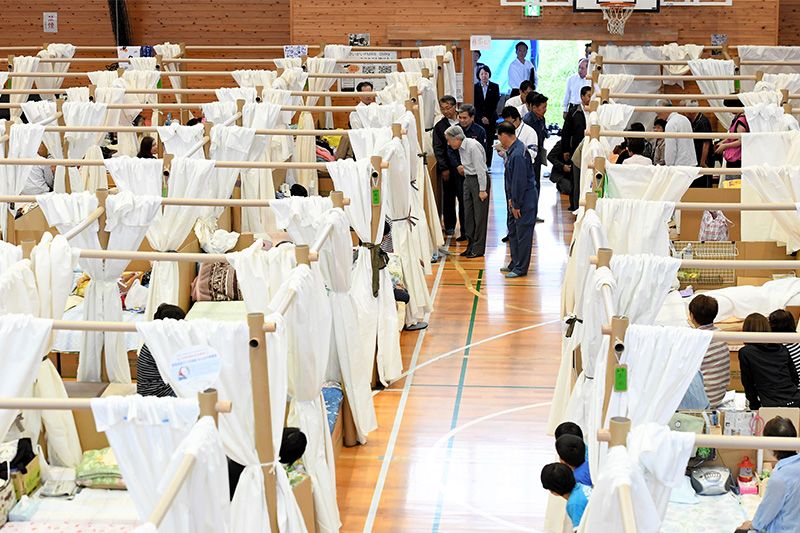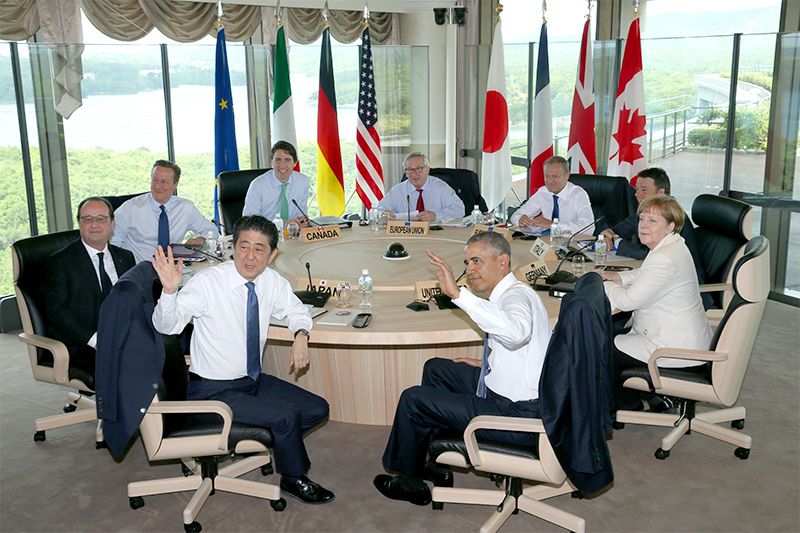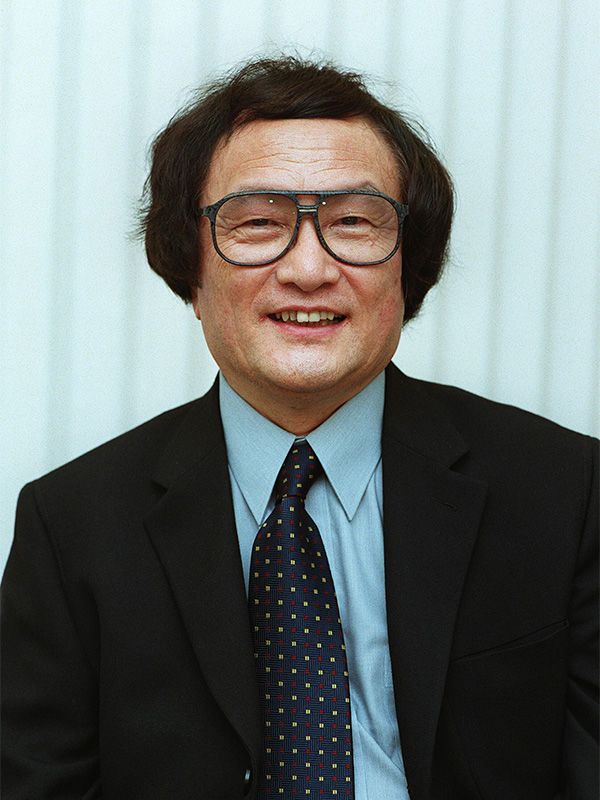Timeline for May 2016
Politics Economy Science Technology Society- English
- 日本語
- 简体字
- 繁體字
- Français
- Español
- العربية
- Русский
1–7
Prime Minister Abe Shinzō meets with leaders in Italy, France, Belgium, Germany, and Britain for preparatory discussions before the Group of Seven summit to be held in Ise-Shima later in the month. He concludes his six-country tour with a visit to Russia on May 6, where he agrees with President Vladimir Putin to take a new approach to the Northern Territories dispute.
3
The yen rises to reach the 105 level against the dollar, its highest level since mid-October 2014. The relative lack of domestic trading during the Golden Week holiday period spurs overseas investors to buy yen and sell dollars.
4
The Ministry of Internal Affairs and Communications announces that Japan’s population of children under 15 years old fell to 16.05 million as of April 1, 2016. This is the lowest number since comparable statistics began in 1950. As a proportion of the total population, children under 15 fell 0.1 percentage point to 12.6%, less than half of the 27.0% figure for seniors aged 65 and over.
8
It is announced that composer and electronic pioneer Tomita Isao died on May 5 at the age of 84 due to cardiac failure. In the 1970s he used the newly invented synthesizer to reinterpret famous classical works. He became the first Japanese artist to be nominated for a Grammy award for his 1974 album Snowflakes are Dancing.
12
Nissan and Mitsubishi Motors announce agreement on a capital and business alliance. Nissan will pay ¥237 billion for a 34% share in Mitsubishi, becoming the controlling shareholder. The smaller automaker has suffered a huge sales decline after the news emerged that it falsified fuel-efficiency data.
Japan’s leading theater director, Ninagawa Yukio, dies in Tokyo at the age of 80. Ninagawa was internationally acclaimed for his direction of a range of works from Japanese plays to Shakespeare adaptations and directed overseas productions almost every year from the 1980s. He was awarded the Order of Culture in 2010.
13
Tokyo Governor Masuzoe Yōichi holds a press conference to apologize for the use of political funds for private purposes, but does not resign. His funding group’s income and expense reports were found to include hotel stays and dinners unrelated to his political activities.
14
One month after major earthquakes hit Kumamoto Prefecture, more than 10,000 evacuees remain in shelters. Over 1,400 aftershocks have been recorded in the first month. On May 23, the Cabinet Office announces that damage costs in Kumamoto and Ōita prefectures—mainly in residential areas—amount to between ¥2.6 trillion and ¥4.6 trillion.
 Emperor Akihito and Empress Michiko visit an evacuation center in Mashiki, Kumamoto Prefecture, on May 19, 2016. (© Jiji)
Emperor Akihito and Empress Michiko visit an evacuation center in Mashiki, Kumamoto Prefecture, on May 19, 2016. (© Jiji)
18
The Cabinet Office announces that GDP rose 0.4% and the economy grew by 1.7% on an annualized basis in the first quarter of 2016. The leap year’s extra day in February is thought to have contributed to this positive trend.
Mitsubishi Motors President Aikawa Tetsurō takes responsibility for the falsification of fuel efficiency data and announces he will resign at the company’s annual general meeting in June. Meanwhile, Suzuki Osamu, chairman of Suzuki, states that his company had not been following government rules on fuel efficiency for its vehicles, but denies that it manipulated data.
19
Former US Marine Kenneth Franklin Shinzato, currently working at Kadena Air Base, is arrested in connection with the killing of Shimabukuro Rina, a resident of Uruma in Okinawa Prefecture. Foreign Minister Kishida Fumio summons US Ambassador Caroline Kennedy to lodge a strong protest.
20
Japan announces that it will accept 150 Syrian refugees as exchange students over five years from 2017, slightly relaxing its highly restrictive refugee policy. With the assistance of the Japan International Cooperation Agency, the project aims to train people who can help to reconstruct the war-torn nation.
21
Aspiring idol and college student Tomita Mayu is stabbed multiple times by obsessed fan Iwazaki Tomohiro at a Tokyo event. Iwazaki, who was arrested at the scene, had sent multiple threatening messages to Tomita on her Twitter account. She remains in critical condition as of the beginning of June.
23
The Ministry of Health, Labor, and Welfare announces that the total fertility rate rose 0.04 point in 2015 to 1.46. It is the first time that the birthrate has risen above 1.45 since 1994.
24
Japan passes its first hate speech laws in a bid to counter inflammatory statements based on racial discrimination.
25
Prime Minister Abe and US President Obama hold talks in Shima, Mie Prefecture. Abe protests to Obama about the May 19 murder of a Japanese citizen by a former US Marine in Okinawa Prefecture. Obama expresses his regret for the incident.
26
Japan’s oldest elephant, Hanako, dies at the age of 69 in Tokyo’s Inokashira Park Zoo. The first elephant to come to Japan after World War II, she was presented to Ueno Zoo by Thailand in 1949.
26–27
The Group of Seven summit is held in Mie Prefecture. The Leaders’ Declaration pledges to “collectively tackle current economic challenges, while laying out foundations for stronger long-term global growth.” At a press conference following the summit, Prime Minister Abe causes a stir by suggesting the state of the world economy is similar to that before the global economic crisis of 2008.
 Prime Minister Abe Shinzō (front left) and US President Barack Obama (front right) attend a working session at the Group of Seven summit in Mie Prefecture on May 27, 2016. Other leaders, clockwise from Prime Minister Abe’s left, are French President François Hollande, British Prime Minister David Cameron, Canadian Prime Minister Justin Trudeau, European Commission President Jean-Claude Juncker, European Council President Donald Tusk, Italian Prime Minister Matteo Renzi, and German Chancellor Angela Merkel. (© Jiji)
Prime Minister Abe Shinzō (front left) and US President Barack Obama (front right) attend a working session at the Group of Seven summit in Mie Prefecture on May 27, 2016. Other leaders, clockwise from Prime Minister Abe’s left, are French President François Hollande, British Prime Minister David Cameron, Canadian Prime Minister Justin Trudeau, European Commission President Jean-Claude Juncker, European Council President Donald Tusk, Italian Prime Minister Matteo Renzi, and German Chancellor Angela Merkel. (© Jiji)
27
Barack Obama becomes the first sitting US president to visit Hiroshima. He tours the Peace Memorial Museum before laying flowers at the cenotaph together with Prime Minister Abe. He then gives a speech in which he mourns all those who died in World War II and expresses the need to pursue a world without nuclear weapons.
30
Prime Minister Abe holds a meeting with Finance Minister Asō Tarō and other senior Liberal Democratic Party and Kōmeitō figures. Major Japanese media report that Abe plans to further delay increasing the consumption tax to 10% and that he will not hold a lower house election on the same day as upper house elections in summer 2016.
31
The Tokyo District Public Prosecutor’s Office drops all charges against former Minister for Economic Revitalization Amari Akira and two of his political secretaries. Amari stepped down as minister in January following reports that he and the secretaries had accepted millions of yen from a construction firm in 2013–14; prosecutors cited insufficient evidence of graft in dropping the charges.
Former baseball star Kiyohara Kazuhiro is given a four-year suspended sentence for possession and use of illegal stimulant drugs. Prosecutors had demanded a 30-month sentence for the slugger, who retired in 2008 after a celebrated career with the Seibu Lions and Yomiuri Giants.consumption tax Barack Obama Nissan Vladimir Putin birthrate Masuzoe Yōichi Hiroshima G7 hate speech Ise-Shima Summit Kumamoto earthquakes Mitsubishi Motors Ninagawa Yukio
